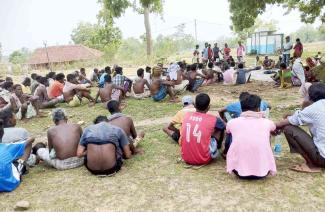
The Dumka district, falling in the Santhal Pargana of Jharkhand state used to be one of its largest districts. It has a rich history of struggle against the colonial rule of the British. Legendary freedom fighters like Siddho-Kanu, Chand-Bhairav and Phulo-Jhano were born here. Today, under Modi rule, the predatory corporates have begun eyeing the forests, land and resources of this region while posing a threat to the environment and indigenous culture of the tribal population. A united, long-drawn struggle is needed to counter this challenge.
Bundu, Tamad
Panchapargana is famous for its natural beauty as well as its revolutionary legacy. The Ulgulan in Jharkhand started from Dombari. The revolutionary history of Birsa Munda is also linked to this region.
The Resha water body in Humta panchayat has been given clearance by the Chief Minister. Earlier, the refusal of permission to this water body from the Gram Sabha had led to its closure. The government is claiming that this land is not Raiyat but belongs to the Pradhan and the panchayat members. It is worth noting that the Gram Pradhan had given his consent for the construction of the water body but the Gram sabha objected because of which this project could not be completed.
If the Resha water body were to be constructed, it would lead to submergence of many villages and forest under water. The government clearance to this project has led to a sense of fear among the people. The will have to organize themselves under the Gram Sabha to stop the construction of such disastrous project.
Another big project in the Tamad region is the gold-mine project. This project, which encompasses many villages, including Behra Bera was given clearance by the government two decades ago and some work was also initiated. Even after 75 years of independence, this village lacks clean drinking water. Toilets constructed under the ‘Swatch Bharat Abhiyan’ lie unused due to lack of water. The lone government school in the village runs without a government appointed teacher. The graduates of the village teach in that school. Access by road to this village is difficult. The government propaganda doing the rounds is that once the mine become operational, all the basic infrastructure will automatically get developed. But people know that they would lose their land and forests in the process. The Gram Mukhia Khuslal Munda says that the project was stopped after a struggle was launched by the people. Village elder Shashi Bhushan Munda recalls that many lives were lost in that struggle. The police used to arrest the locals on charge of being a Naxalite and subjected to torture. The villagers remained resolute in their struggle and as a result, their children are breathing fresh air. But for how long can they resist the attempts to build the gold-mine without building a grass-root resistance?
Ghatshila
Power hungry corporates are giving a caste-clash narrative to a controversy between Kurmis and Mahtos in an attempt to weaken the unity within the Gram Sabha.
In the Mahulisaal village, the government is going ahead with drone-survey, preparing property card, online land consolidation and land bank. The purpose is to complete the ground work for evicting tribals from their land. Government officials are not providing information under the RTI act. On 25 March, many residents from nearby villages gathered for a meeting. The agenda was to prepare a blue print for launching an agitation against the opening of Panna mines in Ghatshila. Many sit-ins followed this meeting. Three attempts to get information using RTI failed to get any response. The government and elected representatives are hand-in-glove in weakening the Gram Sabhas. The elected representatives only lend support orally to the movement but fail to address issues at the grassroots. The people of Ghatshila have seen with their own eyes the havoc caused to the lives of the locals by the Uranium mining in neighbouring Jadugoda. They do not want the same to happen to them.
We spoke to many locals and Gram Pradhans to know their problems. Kishan Munda is Pradhan of Tola village which lies in the affected zone. All said that in lieu of their land, they would not accept a government job. Other problems in the village include the absence of a doctor and medicines in the health centre. There is no facility for delivery of a new born. Ambulance is available 40 km away from the village. The village school has only two teachers.
We spoke to about 40 people in Bautiya village. It was a common complain that the public distribution system, widow and old age pension schemes were in a poor shape. There are only two graduates in the entire village. There is now more emphasis on education of girls.
Jadunath Haansda, the local Gram Pradhan teaches English in a private school. He has been leading the struggle against mining in the region. On 18th June, a convention was organized in the area where local issues as well as threats posed by mining were discussed. 300 people participated in the convention.
Shikaripada
In Shikaripada region, Naupahad and Simani Jod are among the 21 villages affected by mining. Naupahad village with a population of around 600 comprises of 5 tolas. Only 50 people are literate. Electricity reached this village 10 years ago but there is no arrangement for drinking water. Drinking water supply was made available in the village about3-4 months back after a long drawn struggle. The road access to this village is in poor shape. Agriculture is the main means of livelihood of the people but poor irrigation facility led to a drought this year. 30-35 people from this village go to other states to seek employment. The villagers in the 21 villages have decided to strengthen their gram Sabhas to fight against corporate loot.
Charu Bhawan, U-90, Shakarpur, Delhi 110092
Phone: +91-11-42785864 | Fax:+91-11-42785864 | +91 9717274961
E-mail: info@cpiml.org







